Dr. Uché Blackstock Knows She’s a Unicorn
August 30, 2019 | Filed in: Woman of the Week
Uché Blackstock always knew she wanted to be a doctor. What she didn’t anticipate, however, was the role that activism would play in her medical career. Last March, building on years of leadership experience at NYU Langone’s Office of Diversity Affairs, Dr. Blackstock started her own company, Advancing Health Equity, which promotes better health care outcomes by advancing diversity in medicine. Here, she explains how to ask a racist patient to leave a hospital, what it’s like to be the first black mother-daughter legacy at Harvard Medical School, and the secret to working several jobs while raising two children under five.
Want more M.M.? Sign up for our newsletter.
MY MOM WAS ALSO A DOCTOR, and my twin sister and I followed in her footsteps. My mom was my role model, my number one fan, and my cheerleader. She was raised by a single mom on public assistance, and she had five siblings. She was the first person in her family to go to college, and then she went to Harvard Medical School. But when I was a sophomore in college, she got leukemia and passed away at 47 years old.
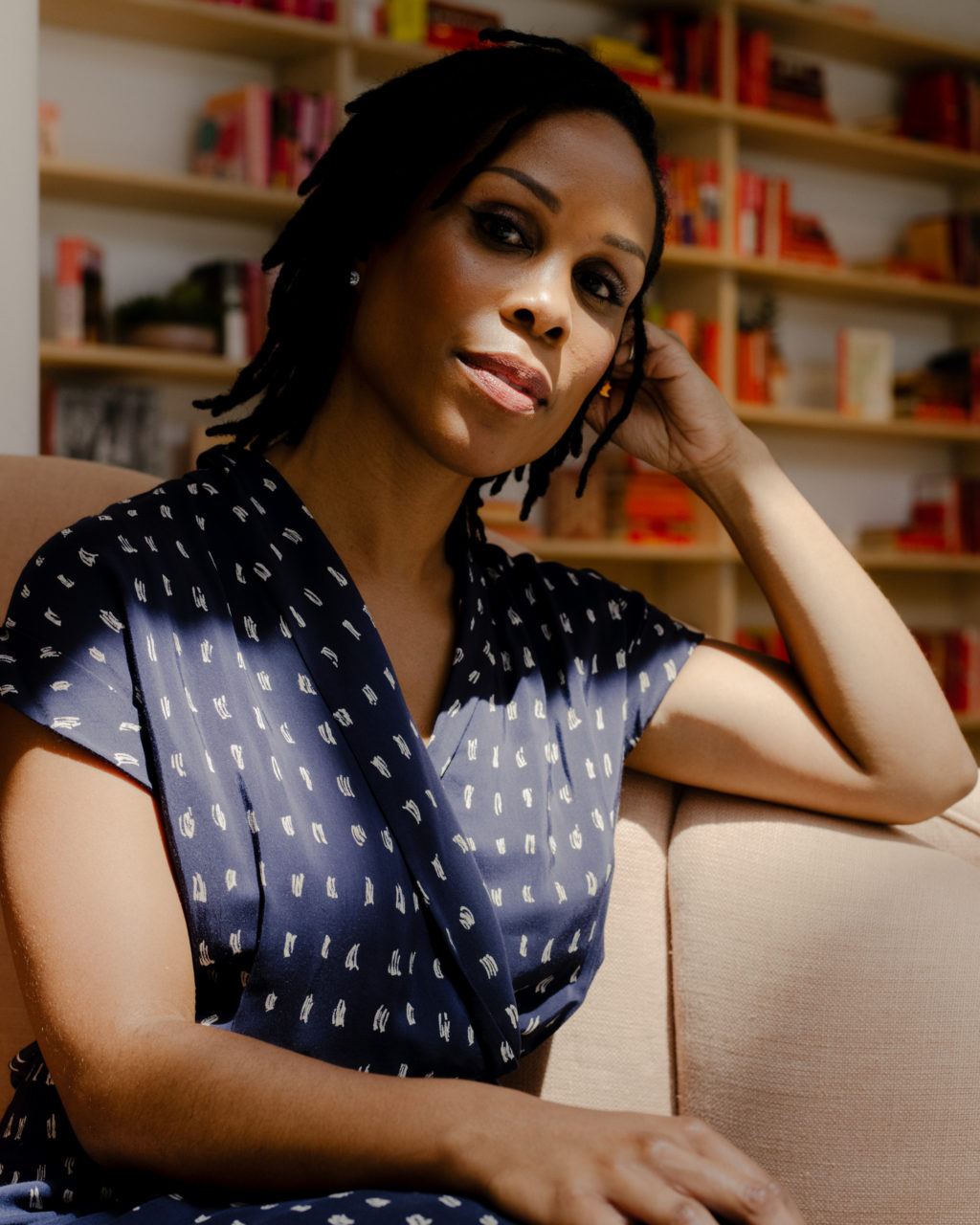
Dr. Blackstock wears the Jasmine dress and the Bezel earrings.
LOSING MY MOM AT 19 YEARS OLD was a life-defining experience. It felt like the rug was pulled from underneath us, and I was so scared. When she was diagnosed, we talked a lot about what life was going to be like without her. She told us how important it was to take care of ourselves and each other. She also encouraged us to take time off after college. My sister and I were both pre-med, so she knew that we were ultimately headed to medical school, but she made sure that we knew that we had to take care of ourselves first. I appreciated that, coming from her.
MY SISTER AND I JOKE THAT WE’RE EACH OTHER’S GIFT FROM OUR MOM. If anything happens or I have a crisis, my sister is the first person I call and vice versa. We’ve never been competitive—it’s not how we were raised. Now we have our own families, but we still text all the time.
I HEEDED MY MOM’S ADVICE and took two years off after college, just to get grounded before I went to medical school. It was the best decision I could have made, to take time off for myself and to mourn, because school was so intense that I didn’t always have time or space to process my emotions. During the first year, I taught high school biology and chemistry at a private school in Chicago. Then I came back to Boston and spent a year working for a non-profit called Health Care For All. My sister and I graduated from medical school the same year. We were the first black mother-daughter legacies from Harvard Medical School.
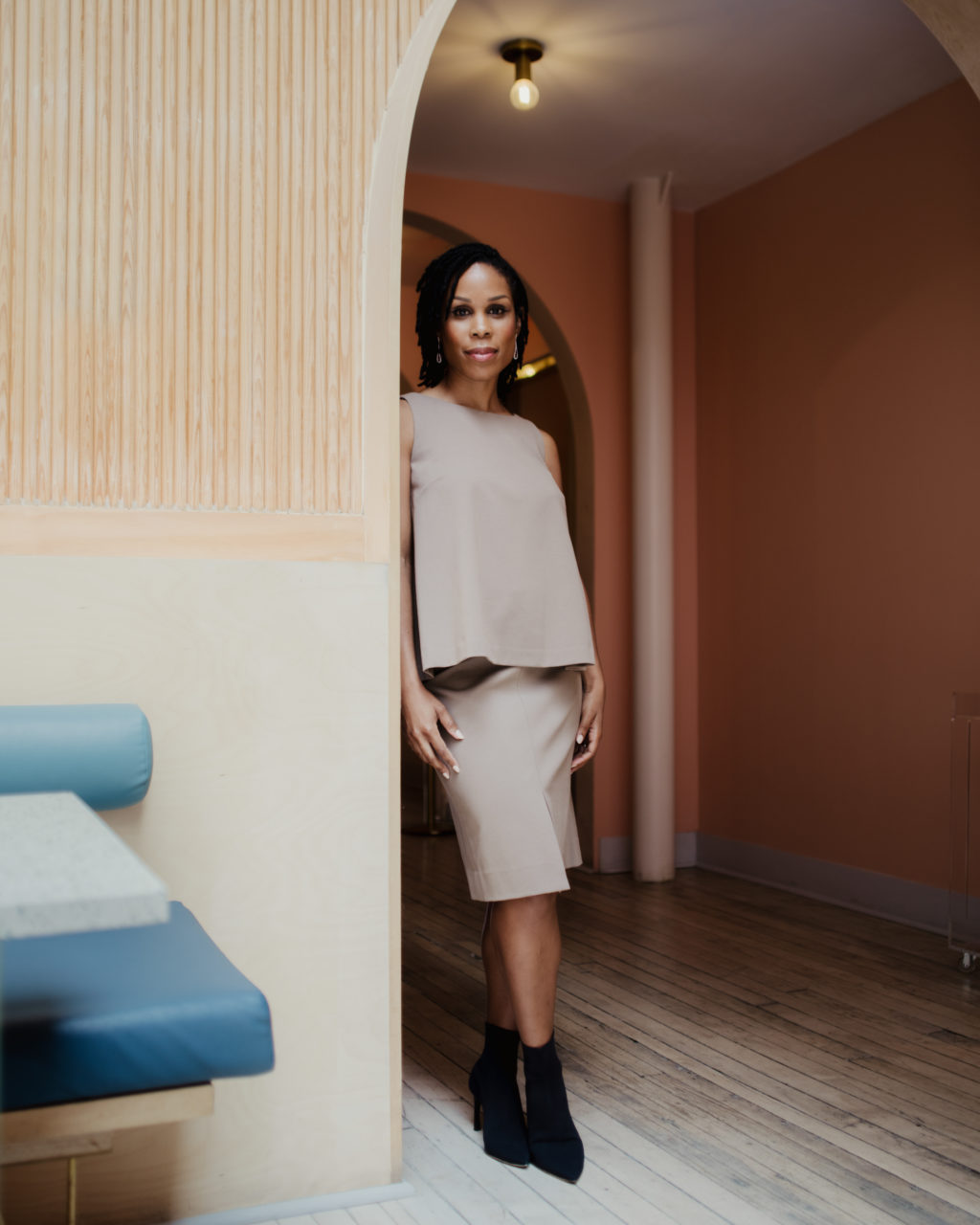
Dr. Blackstock wears the Harriet top, the Greenpoint skirt, the Portia earrings, and the Lana boot.
I KNEW PRETTY EARLY ON THAT I WANTED TO PRACTICE EMERGENCY MEDICINE. When I was a first-year medical student, one of my instructors was an emergency medicine physician, and I shadowed him one evening. I was so interested in the variety of patients he treated. You might see a patient with something as benign as a cold and then see someone who had a collapsed lung or terminal cancer. You never knew who would come through the door next, and I liked that.
WHEN I STARTED PRACTICING, I knew I wanted to stay in academic medicine, so that I could teach in addition to doing clinical work. I do one shift a week at the hospital, and then I have three other roles at the NYU School of Medicine, including a leadership role in our Office of Diversity Affairs.
ONLY 2 PERCENT OF PHYSICIANS ARE BLACK WOMEN, so I’m a bit of a unicorn. Once I realized how small our numbers were, I also realized that the diversity of our workforce directly impacts our patient care. There’s a lot of disparity and inequity in the healthcare field. There’s also a rich history of racism in medicine, especially in black communities and black populations. When I have a patient who sees that I look like her, I think we have a different connection.
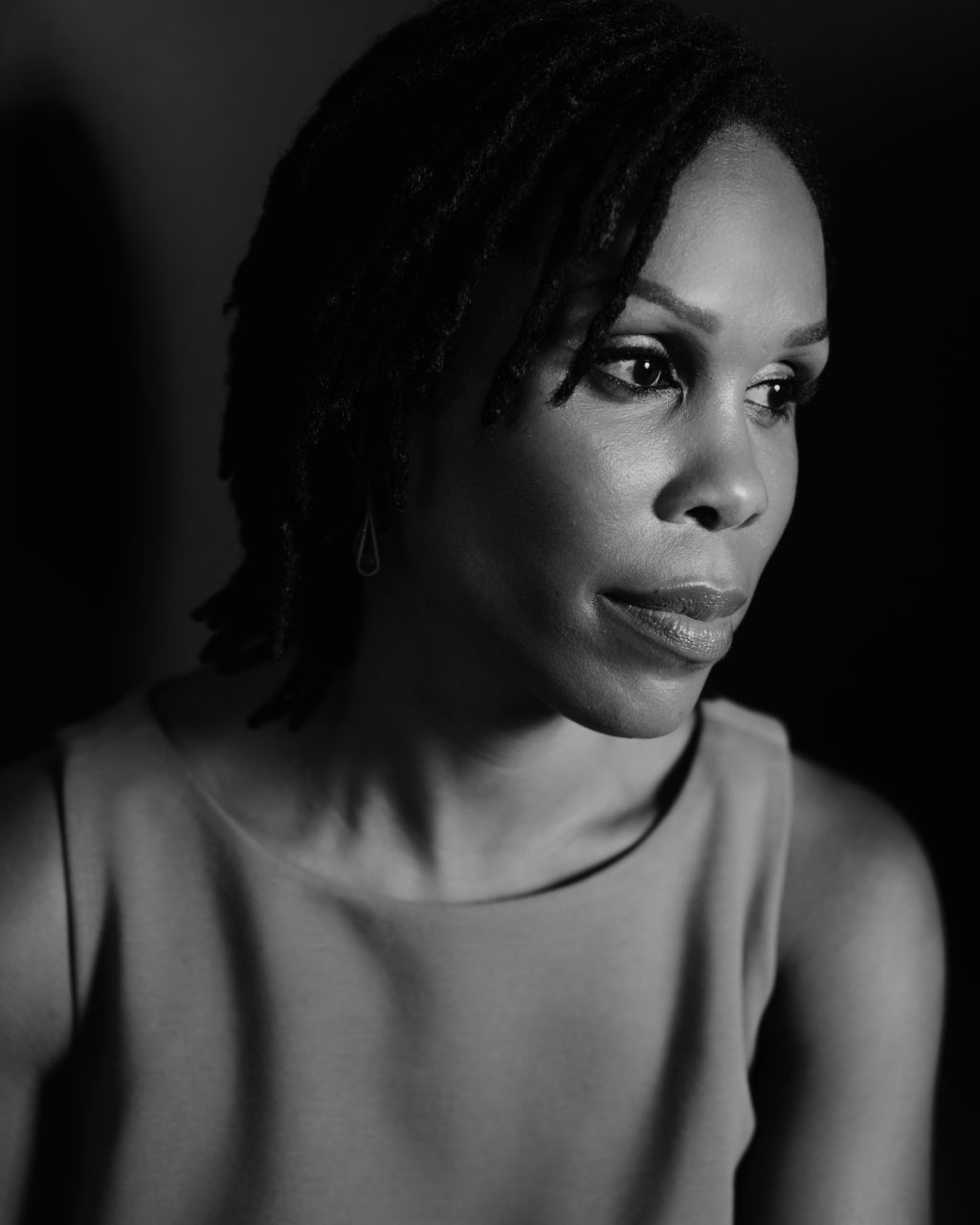
Dr. Blackstock wears and the Harriet top and the Portia earrings.
I STARTED MY OWN COMPANY, ADVANCING HEALTH EQUITY, IN MARCH. Now I partner with different health care organizations to provide training and other education that will address my concerns about disparities and lack of diversity in health care. Eventually, I would love to transition out of clinical medicine and focus solely on my business. That way, I can have a wider influence than just in one organization. When you work for a big institution, it can be difficult to have the independence to do the activism work that I want to do. I love the idea of working for myself and discussing the materials in my own way.
I NEVER THOUGHT I WOULD START MY OWN BUSINESS. If you’d asked me a few years ago, I would’ve said, “No. No way.” But honestly, I feel like my kids have made me braver. I want them to be proud of me. I also feel like if my mom were here, she would say, “Baby girl, you can do this.” Whenever I have moments of self-doubt, I think about all the hard work she put into raising my sister and me. She wanted us to believe we could do anything.
A TOPIC I FOCUS ON A LOT IS UNCONSCIOUS BIAS and how it influences patient-clinician interaction. Another big one is structural racism and how it has shaped health outcomes. The reason we have such big health disparities today is because of longstanding practices and policies that affect marginalized communities, and it’s a matter of life and death. We know the numbers for black women’s maternal mortality rates. As a black woman, even though I have an advanced degree, my risk of dying around childbirth or having pregnancy complications is the same as a white woman with an eighth grade education. These disparities persist even when we control for socioeconomic status, and it’s critical that we address them.
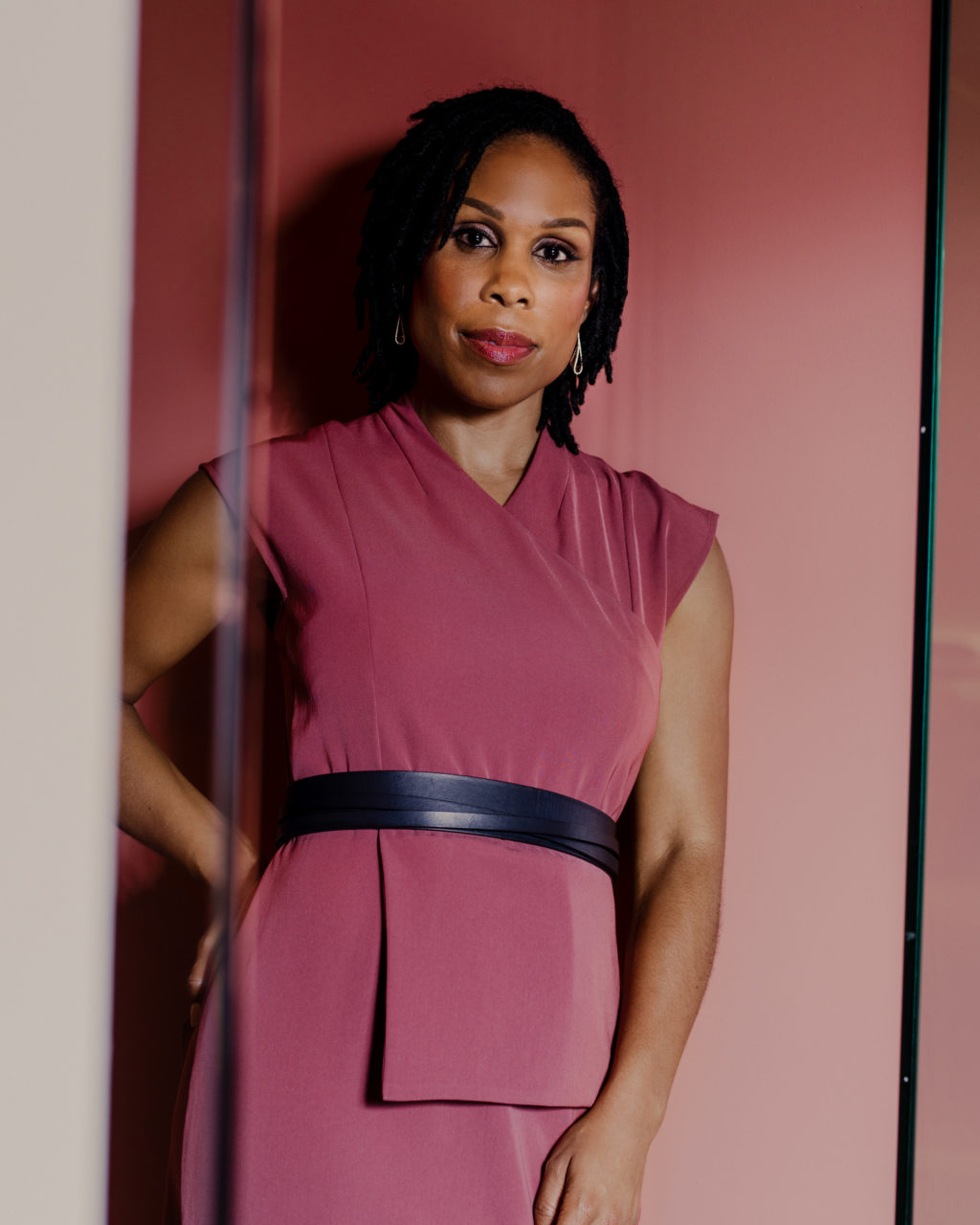
Dr. Blackstock wears the Elecia dress, the Portia earrings, and the Crossover belt.
ANOTHER BIG CONCERN IS THAT MANY HEALTH CARE PROVIDERS have to deal with mistreatment at work. Especially over the last few years, in the current political climate, we have noticed a lot of harassment of providers of color by patients. And we know that can lead to burnout and high rates of attrition among a population of clinicians that’s already very small. We don’t want that to happen. It’s important that we create environments within hospitals where everyone feels respected, and where they’re able to do the best job possible. If we don’t have a diverse workforce, and people are falling out because they’re not treated well, that directly impacts patient care. It’s all linked to each other.
WHEN YOU’RE GOING ABOUT YOUR JOB, taking care of patients, and then someone says something racist or sexist to you, it’s incredibly jarring. Sometimes I will beat myself up because I didn’t have a good comeback, but it’s because I was so shocked. We work to create policies within hospitals that can support clinicians when these situations happen. And it’s not just about defending yourself; we educate other clinicians who may overhear an inappropriate comment and say, “Hey, we don’t allow that.” But it’s complex, because you have to make sure that the patient has the capacity to understand what he or she is saying and is not intoxicated or psychotic. And of course, they can’t be in critical condition. But once you tease that out, then you can ask them to leave. I’ve done it several times. I recently had to ask a patient to leave because he refused to see one of my residents, who is a Persian American, because he thought the resident was a Muslim.
TO AVOID BURNOUT, I EXERCISE CONSISTENTLY, usually three to four times a week, which I’m proud of. It’s also important to connect with my good friends and my sister. I always make time to go out for dinner or brunch or drinks with my girlfriends because it really lifts the load off my shoulders—I find it incredibly relaxing. Then I try to meditate three or four times a week. I use the app Headspace, and I set myself reminders to do it, either when I wake up in the morning or before I go to sleep. It’s hard, because I have a two-year-old and a four-year-old, so I never feel like my time is mine.
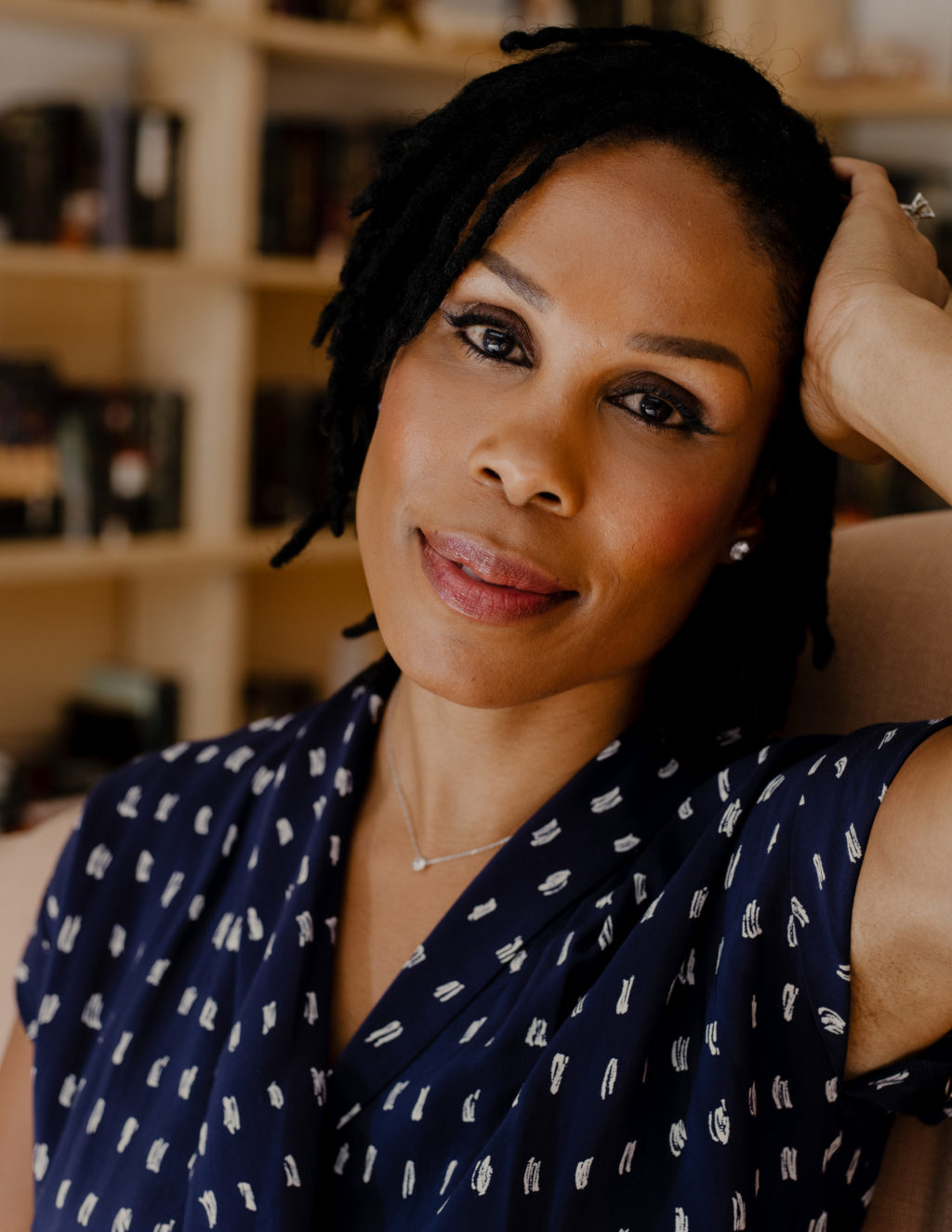
Dr. Blackstock wears the Jasmine dress, the Bezel earrings, and the Bezel necklace.
WHEN MY YOUNGER CHILD TURNED TWO in December, I finally felt like I was coming up for air. I definitely felt like I had lost a little bit of myself in motherhood for about four years, and now I’m feeling like myself again. When my kids were very little, it was incredibly intense, especially when I went back to work and still nursing. I nursed my older child for over two years. Juggling that with the expectations of what it means to be a working mother, I definitely felt pressure. But it’s important to do what’s right for you, because what may be right for one working mom may be different for another. I was only able to nurse my second child for four months. I felt like such a failure, and it wasn’t until recently that I finally forgave myself. He’s going to be fine. I think a lot about trying to be a role model to my children. If I’m going to be away from them, at least I’m doing good work.
THE ONLY WAY THAT I’VE BEEN ABLE TO DO ALL OF THIS is that I’m very organized. My hack is that I schedule everything in my Google Calendar, even if it’s going to the store to get toothpaste. That’s the only way that I’m going to remember to do anything. Also, I realized after I had kids that I didn’t need to spend as much time on certain things. Before I had kids, I would spend weeks preparing a presentation, working on the slides and practicing. After my first child, I had to travel to Arizona to give a presentation, and I worked on the slides for one or two hours because that’s all the time I had. It wound up being the best presentation I had ever given. After that, it dawned on my that I’d been putting 400 percent effort into it, and instead I could just put 100 percent effort into it, or even 90, and the result would be just as good. I would say to myself, “Look, I only have three hours to work on this, and that’s all I got.”
Photographs by Heather Sten. Styling by Nyjerah Cunningham.





